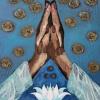 Submitted by Namaste on
Submitted by Namaste on

pixabay.com
Ancient Persians named composite India where river Sindhu flows as Hindu nation and it’s people as Hindus (because they use vowel ‘Ha’ instead of ‘Sa’) and the nomenclature ‘India’ is the derivation from Indus, the other name by which river Sindhu was known to the Westerners.
Puraanas refer to this country as Bharatha Khanda, Bharathavarsha or as Jamboo-Dweepa. Swami Vivekananda, the awakener of modern India had preferred to call Hindus as Vaidikas, the followers of Vedas or Vedaantists, the followers of Vedaanta.
As we know most of the world religions are born out of the words of a Master and the ancient texts of Hindus are the Vedas. However this is not believed to be uttered by any person, neither can there be a specific time period for them. It might seem odd but the Vedas are eternal and existed before time. They were however discovered by the lineage of Sages or Rishees but they cannot be attributed to them.
Origins of OM Mantra
As per the ancient texts, when the higher power manifested this world, the energy was present in all spaces in the form of vibrations knowns as Shabad Brahma. This pure sound vibration is manifested as the ‘OM’ Mantra, the resting place of everything, or in other words, all potencies are invested within this Holy vibration.
Lord Krishna in Bhagavad Gita says:
"I am the father of this world, the mother, the supporter, the person to be revered, the one to be known, the holy one, the sacred syllable ‘OM’ as also the Rig, Saama and Yajur (Vedas)."
How Vedas were first compiled into written form is explained thus: Lord Vishnu taught the Vedic knowledge to Lord Brahma who in turn taught this to other great sages and mystics (who had observed the life long vow of celibacy in order to retain the Vedas in their memory) who become manifest, including Naarada Muni who taught it to others. This is where the oral traditions began and for thousands of years Vedas were carefully handed downs this way till sage Vedavyaasa, at the end of Dwaapara Yuga, divided it into four parts and put them in written form so that less intelligent people of Kaliyuga, the present age, could more easily understand them.
The 4 Big Vedas
The four Vedas are: Rig-Veda, Saama-Veda and Atharvana-Veda. Historical facts and authentic stories mentioned in puraanas are called the fifth Veda. Vedas, Vedaanta Suutras and Brahmanas, Aranyakas and Upanishads are all considered to be ‘Shruti’, the original revealed knowledge. Other parts of Vedic literature consisting of Mahabhaaratha, Bhagavad Gita, Ramaayana and other puraanas are called ‘Smriti’. A person who follows the parts as directed by Shruti and Smriti is called Aarya.
Few of the other Vedic literatures are:
(1) Aayurveda- Original Science of holistic medicine as taught by Lord Dhanvantri.
(2) Dhanurveda- Military Science as taught by Maharshi Bhrigu.
(3) Artha Shaastra- Science of Government –Politics.
(4) Gandharva Veda- an art of music, dance, drama etc.,
(5) Stapatya Veda- Science of Architecture. Ratha (Chariot) Shilpa, Vimaana (Aeroplane) Shilpa, Nauka (Ship) Shilpa, Durga (Fort) Shilpa, Nagara (Town) Shilpa, Murthy (Sculpture) Shilpa etc.,
(6) Manu Smriti- Vedic Law Book- based on Dharma-Suutra of the Maanavaas.
(7) and Paaka Shaastra, Kaama Shaastra etc.
Sanskrit and Vedic Language:
Sanskrit is the ancient sacred and literary form of language of India as distinguished from the earlier Vedic. It is of great interest to linguists because of the stimulus which the introduction of Sanskrit Western Scholarship gave to the development of modern linguistic science (H.A. Gleason Jr.)
‘Vedas’, the most ancient documents of Indian thought, culture and sacred lore pave the path of final release or moksha through righteousness, and as such, their message and teachings cut across all the possible boundaries of country, creed and age. They are universal in their meaning and appeal, and belong to the whole humanity and are for all ages. The great German thinker Max Mueller very emphatically says, “I maintain that for a study of man, there is nothing in the world equal in importance with the ‘Veda’. I maintain that to every body who earns for himself, for his ancestors, for his history or for this intellectual development, a study of Vedic literature is indispensable…. To the present day India acknowledge no higher authority in matter of religion, ceremonials, customs and law than the Veda”. What constitutes Vedic lore, stands alone and apart in it’s splendor like the Pole Star shedding the divine light for the onward progress of entire humanity.
Though there are four Vedas traditionally they are spoken as “Trayi”, the Triple Vidya or the threefold knowledge, because they deal with Jnaan, Bhakti and Karma and are in prose, verse and songs. The Rigveda underline the path of Jnaan or knowledge, the Yajurveda that of Karma or Action, and Saamaveda that of Bhakti or Devotion. Atharvanaveda represents a synthisis of the three.
Therefore the Vedas are invariably referred to as the “Triple Eternal Vedas” (Trayam Brahma Sanatana), probably also because the fourth one i.e., the Atharvanaveda is relatively of quite a late orgin. These four together form the foundations of Indian religious, philosophical and cultural systems and observances. Indian culture and civilization has survived the ruthless ravages of time all these millenniums only because it is based on the rock like foundation of the wisdom of the Vedas.
The Vedas have categorically declared many times that Reality is one, sages call it by various names; God is one, but it’s dimensions are several. The various Vedic Gods are simply the different manifestations of the same Reality. This so called multiplicity of Gods amply reflects the essential Vedic doctrine, “All paths lead to the same goal”. The truth is one and every one is seeking it. The individual temperament, time, place, name etc., create the so called differences. The world is but the manifestation of a part Him:
“What was, What is and what shall be
All is OM
Whatever else is beyond the bound of three fold time
That also is OM
nishichawla
http://www.metaphysics-knowledge.com/beliefs/origin-of-word-hindu.html/
- 874 reads